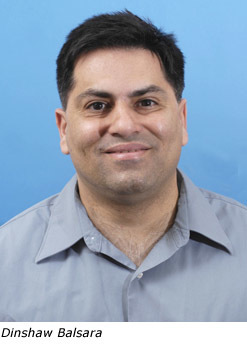
Dinshaw Balsara, associate professor of physics, has won a National Science Foundation grant to advance his groundbreaking work that has application to science and engineering in general as well as astrophysics in particular. The grant, “Multidimensional Riemann Solvers and Higher Order Schemes with AMR for Computational Astrophysics” is related to Balsara’s “Numerical PDE Techniques for Scientists and Engineers,” text and software used in an interdisciplinary Applied and Computational Mathematics and Statistics/Physics course.
Balsara’s group has made significant progress in the three areas addressed by the grant that are important for high performance computing. It has built multidimensional Riemann solvers that work on a broad class of hyperbolic conservation laws, permitting numerical codes to take larger timesteps for the same computational cost. In an international collaboration, the group has developed innovative, successful high accuracy numerical methods, which is very valuable in high performance computing. Balsara’s paper on Adaptive Mesh Refinement (AMR) showed that solution adaptive simulations could be carried out for the magnetohydrodynamic equations, an important focus for the NSF.
The grant will help Balara’s group build exemplar applications for its astrophysical research, facilitate community-wide code release and support, and promote the introduction of his text to educators from other universities at a later NSF-sponsored workshop at Notre Dame. Balsara has been invited to teach short courses from his text at universities in France, Germany and Spain.
